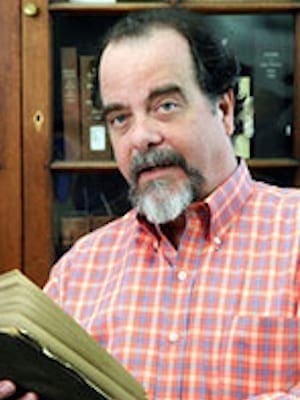The wind of controversy over the influences of science and religion are swirling, again. In Cobb County, Ga., folks on both sides of the debate are hoping that they might inherit the wind and use it to blow away their opponents. That probably won’t happen anytime soon, but there is good reason to wonder if we are headed back to Dayton.
Dayton, Tenn., was the site of the famous Scopes Trial in 1925 where Clarence Darrow and William Jennings Bryan entered the lore of American drama on the stage of a local battle over the teaching of evolution.
The Scopes Trial really never ended. In a deft move as the trial was winding down, Darrow implored the jury to return a guilty plea against his client, John Scopes. It was clear that Darrow hoped for an appeal to the state Supreme Court.
According to Tennessee law, his move prevented Bryan from delivering his final appeal to the jury. The guilty verdict was passed and court adjourned. Darrow went hiking in the mountains and Bryan died in his sleep–still in Dayton–only six days after the trial.
A year later the verdict was overturned on a technicality and the court dismissed the case altogether, noting “that nothing is to be gained by prolonging the life of this bizarre case.”
The tempest in Georgia was stirred up in 2002 when the Cobb County Board of Education approved affixing stickers to high school biology textbooks that read: “This textbook contains material on evolution. Evolution is a theory, not a fact, regarding the origin of living things. This material should be approached with an open mind, studied carefully, and critically considered.”
The sticker also includes a specific endorsement: “Approved by Cobb County Board of Education, Thursday, March 28, 2002.”
In mid-January 2005 a federal judge ruled that the simple sticker on the inside cover of public school science books amounted to an unconstitutional endorsement of religion. Judge Clarence Cooper wrote, in part, that “by denigrating evolution, the school board appears to be endorsing the well-known prevailing alternative theory, creationism or variations thereof, even though the sticker does not specifically reference any alternative theories.”
Since the 1970s creationism has struggled to present itself as a viable alternative to the tentative conclusions of the modern sciences of biology, geology, paleontology, astronomy and more.
The Institute for Creation Research, founded by Henry Morris, an engineer, in 1963 (and renamed in the early 1970s) became a bulwark for those who were committed to a particular reading of Christian Scripture that took Genesis 1 as a definitive explanation of the origins of the universe.
At every turn over the last 30 years the critics of Morris and his followers have challenged the narrowness of the creationism perspectives.
Dale Moody, that firebrand Baptist theologian at Southern Seminary during the Golden Age of that institution, used to bellow that “Creation-Science is like Grape-Nuts: no grapes, no nuts.” He meant that the claims of creationists lacked the clarity and integrity of both theology and science in the same way that a popular breakfast cereal called Grape-Nuts contains neither grapes nor nuts.
Moody’s bombastic yet clever, critique of Creation-Science echoes the sentiment of the Father of Modern Science, Sir Francis Bacon (1561-1626).
In his foundational work–The New Organon–that articulated the methods of what we now know as “science,” Bacon wrote: “Yet in this vanity some of the moderns have with extreme levity indulged so far as to attempt to found a system of natural philosophy on the first chapter of Genesis, on the book of Job, and other parts of the sacred writings, seeking for the dead among the living; which also makes the inhibition and repression of it the more important, because from this unwholesome mixture of things human and divine there arises not only a fantastic philosophy but also a heretical religion. Very meet it is therefore that we be sober-minded, and give to faith that only which is faith’s.”
Bacon in the 17th century and Moody in the 20th century knew the same thing: the impulses of religion and science are very different.
Religion (or theology) attempts to confess the convictions about why there is something rather than nothing. Theologians struggle to make clear their confidence that a purposeful and compassionate Creator is behind and in front of our world.
Scientists, on the other hand, struggle with the evidence of the physical world. Rather than asking the questions of Who is behind the created order, scientists ask the questions of How the universe behaves.
But here is the important point: theologians and scientists need not be in pitched battle to prove that one is right and the other is wrong. Theological confessions are as theoretical as scientific confessions and vice-versa. A more productive path will be open conversation between theologians with scientific curiosities and scientists with theological inclinations.
The controversy in Cobb County doesn’t have to end in ideological bloodshed. It could end in a cleansing.
In Job 38 God spoke to Job “out of the whirlwind.” The wind of God’s presence transformed Job’s questions into better questions. Job’s “Why am I suffering?” was transformed into “In Whose world am I suffering?”
Will it happen? Probably not. But at least there is some hope about what wind we might inherit. Better questions just might blow our way, if we allow them.
Richard Wilson is professor of theology and chair of the Roberts Department of Christianity at Mercer University in Macon, Ga.

